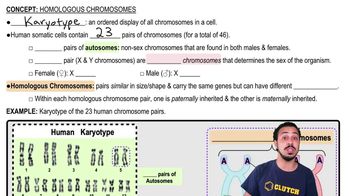Homologous Chromosomes quiz Flashcards
 Back
BackHomologous Chromosomes quiz
1/20
Terms in this set (20)
- What is the process called where sperm and egg cells merge together?The process is called fertilization.
- What type of cell division produces haploid gametes?Meiosis produces haploid gametes.
- What are gametes in males and females called?In males, gametes are called sperm cells, and in females, they are called egg cells.
- What does the term 'haploid' mean in the context of chromosomes?Haploid means having half the number of chromosomes, or just one copy of every chromosome.
- What is the first diploid cell formed after fertilization called?The first diploid cell formed is called a zygote.
- What process allows a zygote to develop into a baby with trillions of cells?Mitosis allows a zygote to develop into a baby with trillions of cells.
- What does 'diploid' mean in terms of chromosome number?Diploid means having two copies of every chromosome.
- What is the scientific term for sex cells?The scientific term for sex cells is gametes.
- What is the role of meiosis in the life cycle of sexual reproducers?Meiosis produces haploid gametes necessary for sexual reproduction.
- What happens during fertilization in terms of chromosome number?During fertilization, haploid sperm and egg cells fuse to form a diploid zygote.
- What is the chromosome number of a zygote compared to gametes?A zygote is diploid (2n), having twice the chromosome number of haploid (n) gametes.
- What process follows fertilization to allow the zygote to grow?Mitosis follows fertilization to allow the zygote to grow.
- What is the significance of homologous chromosomes in meiosis?Homologous chromosomes pair up and segregate during meiosis to ensure genetic diversity.
- How do homologous chromosomes differ from sister chromatids?Homologous chromosomes are pairs of chromosomes, one from each parent, while sister chromatids are identical copies of a single chromosome.
- What is the result of meiosis in terms of genetic variation?Meiosis results in genetic variation through the independent assortment of chromosomes and crossing over.
- once the chromosomes have formed a pair, what are they called?Once chromosomes have formed a pair, they are called homologous chromosomes.
- which of the following statements best describes homologous chromosomes?Homologous chromosomes are pairs of chromosomes that are similar in size, shape, and gene content but may carry different alleles.
- which of the following statements about homologous chromosomes is correct?Homologous chromosomes consist of one chromosome inherited from each parent and are similar in size, shape, and gene content, but can have different alleles.
- homologous chromosomes _____.Homologous chromosomes are similar in size, shape, and gene content, but may carry different alleles, and consist of one chromosome from each parent.
- which illustration depicts homologous chromosomes?An illustration depicting homologous chromosomes would show two chromosomes of similar size and shape, carrying the same genes but possibly different alleles, one from each parent.

